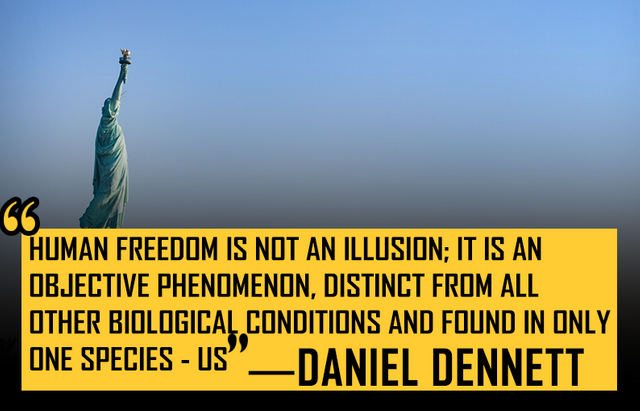Freedom and society

"In short, the isolated man cannot be conscious of his freedom. To be free for man as such by another man, by all the men around him. Freedom is not, therefore, an act of isolation, but of mutual reflection, not of exclusion, but on the contrary, of alliance, since the freedom of every individual is nothing other than the reflection of his humanity or human right in the conscience of all free men".
M.A. Bakunin God and the State.
"The only freedom which deserves the name is that of pursuing our own good in our own way, so long as we do not attempt to deprive others of theirs, or impede their efforts to obtain it. Each is the proper guardian of his own health, whether bodily, or mental or spiritual. Mankind are greater gainers by suffering each other to live as seems good to themselves, than by compelling each to live as seems good to the rest."
John Stuart Mill On freedom.

The two previous quotes outline one of the basic dualities in the theoretical analysis of freedom. Most people in their teens have heard this premise that our freedom ends where the freedom of others begins; with it our parents or teachers wanted us to understand that there are concrete limits to our actions within society. However, this premise is misleading, it defines individual freedom and the obstacle that society represents for it but it forgets that human society is, to a large extent, a condition for the possibility of our freedom as individuals.
From Modernity to the present day, an individualistic concept of freedom has prevailed; freedom is associated with individual rights or with the capacity of individuals to carry out specific actions. And, truly, it is not a falsehood that other men are a brake on my freedom; their judgment, strength, desire... limit my actions and thoughts sometimes. Many civil freedoms are socially assumed covenants by which the individual can act against the majority. For example, freedom of expression is the recognition that any individual can express divergent opinions to the rest of the social group without being persecuted for it; sexual freedom also implies not only the right to have sexual relations with whomever one wants but also, and above all, the right not to have them or to marry whomever one does not want.
In developed societies it is understood that the individual possesses certain rights in which the collective cannot interfere; no matter how much it offends the opinion of a dissident or someone who sexually rejects us, society does not have the power to restrict or condition our actions without a fair reason. We cannot underestimate the value of the individual and his inalienable rights, but neither can we ignore the fact that freedom is not only a construction of the individual, the rest of society appears not only as a wall that limits my concrete freedom but also as an essential element for the attainment and defence of this personal freedom.
Why does the Russian philosopher affirm that freedom is an alliance rather than an exclusion? For instance: Walking alone on the mountain you find a path closed by an avalanche, you try to pass but you can't, you don't have the strength to remove the stones or equipment to avoid them; you just have to go back and find another route. If you had gone with a companion he could have helped you to push away the reefs or to climb over them; with him, you are freer, you can do things that you couldn't do alone.
Extrapolate the example from our global society. Thanks to technological development, we are freer than a century ago to move, live healthily, learn... With an airplane we can travel across the Atlantic in hours and not weeks; our lives are longer, which undoubtedly gives us a greater field of activity while we live; thanks to the Internet and the dissemination of libraries we can access a huge amount of information from which to choose... All this thanks to breakthroughs in science, the outcome of collaboration between people. The worker who builds a road increases my freedom of movement; the scientist who investigates a cure increases the duration of my existence and with it my capacity for action; the computer scientist, the baker, the artist, the friend... to sum up, the others are more often enablers and supporters of my freedom than enemies of it. What happens is that this possibility is taken for granted, we live in it, however, the hindrance of other wills is something of which we have a more energetic conscience.
The dogmatically individualistic perception of freedom leads us to consider our neighbour as a stumbling block to our development when this is not always the case; but to replace this dogma with a merely social or a socialist vision of freedom is also biased and can be excessive. An excessively social perspective of freedom may conclude that individual freedoms are a brake on collective freedom. Thus, the dissident or the one who is different attacks group homogeneity and makes the common mentality uncomfortable and must be eliminated. For example, religious intolerance that prohibits atheism in a given community is justified on the grounds that the atheist is a risk and a scandal to the majority, and since the individual needs the help of society to live, society can legitimately deny him the right to dissent.

Certainly, society contributes to the construction of our own individuality and allows us to expand our degree of freedom, but it is no less true that the progress of society is only possible when there are strong individuals within it who are capable of influencing the collective body. Concrete people who, in their time, raised awareness of injustices, artists who created exceptional creations that have enriched our history, or anonymous heroes who sacrificed their lives for the sake of a more humane world, are examples of how individuality is something worthy of being promoted in the face of social homogeneity. The freedom of the individual is, to a large extent, a social construct, but the progress and freedom of societies is also the result of specific individualities.
The individualistic perspective of freedom implicitly assumes that I can be freer at the expense of the freedom of others: if the freedom of others is a limit to my own freedom, nullifying the freedom of others would increase my own freedom. Slavery starts from this idea: the master acquires power and independence because other men without recognize him as the authority and willingly - due to a harm situation - work for him. Mercantilism imposes this individualistic and simplistic view of freedom not only because it promotes the earn of profits above all on behalf of a small bourgeoise but also because mercantilist societies base their high degree of material freedom on pillaging and oppression of other societies, one should only take a look of colonialism to understand it. The exploitation of other peoples' natural resources, the economic blackmail of debt or trade with countries where workers lack the slightest labor rights are clear examples of how mercantilist societies base their freedom and development on the slavery and impoverishment of other societies.
Therefore, although we must not forget the importance of defending individuality, today we must stress that individual and collective freedoms are, to a very large extent, the result of social collaboration; in a globalized world our freedom as individuals and as societies cannot be based on the slavery of other subjects or groups. As Bakunin maintains, full human freedom can only be achieved when we understand its absolute value, when we see the reflection of our freedom in the freedom of every man; without this look our individualistic freedom becomes our own cell, the other an enemy.
Posted from my blog with SteemPress : http://blackliberal.vornix.blog/2018/07/07/freedom-and-society/
@blackliberal you were flagged by a worthless gang of trolls, so, I gave you an upvote to counteract it! Enjoy!!